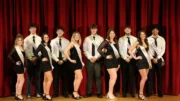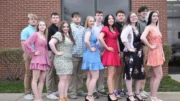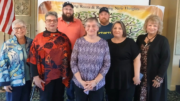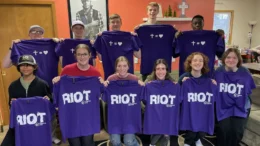COCHRANTON — The world was watching the French Creek Valley in the 1750s, including the actions of a then unknown 21-year old Virginian named George Washington, during his more than 500 mile wintertime expedition into the Pennsylvania frontier. Washington’s 1753 trek, as well as a sequence of other events throughout this turbulent period, would have a dramatic impact on global events and shape the history of the era.
A living history event titled, “1750 – A Gathering Storm in the French Creek Valley” will be held Saturday at the
fairgrounds in Cochranton. An acclaimed group of authors, historians and re-enactors will stage a full day of presentations and exhibits on Saturday to explore this pivotal time period and the events that happened here in northwestern Pennsylvania. Re-enactor encampments and living history programs will continue into Sunday.
The event, set to run from 8 to 7 p.m. Saturday, will open with a group of re-enactors, representing French, British and Native Americans, paddling down French Creek. Coming ashore near the junction of Sugar Creek, they will establish military encampments and foraging camps. These camps will be open to the public and visitors will have an opportunity to observe and experience the lifestyle and hardships of the period.
The main fairgrounds will feature informative demonstrations and displays. An artifact display of Native American materials will be housed in one of the museum buildings and for those with an interest in the field of Archaeology, Mercyhurst University’s Archaeological Institute will conduct a series of “dig boxes” for the aspiring artifact hunter, demonstrating the modern procedures used to rediscover the past.
The central feature of the grounds on Saturday will be the speaker’s tent. The day long program will cover the perspective of the three major groups who influenced the French Creek Valley during the period, the French, English and the Native Americans. As these groups clashed and vied for control of the region, they set into motion a cascading sequence of events that would ignite a world conflict. The keynote presentation will be provided by Professor David Preston, Westvaco Professor of National Security Studies at The Citadel, Charleston, South Carolina.
A native of Grove City, Preston is a highly regarded author of several award winning books detailing the turbulent 1700 to 1800 period throughout the western frontier. The State Museum of Pennsylvania will be represented by Senior Archaeologist James Herbstritt, with his presentation focusing on the waterborne technology of the prehistoric and colonial periods that proved pivotal in transporting men and supplies throughout the region.
Joining the discussion will be author Brady Crytzer, a professor at Robert Morris University and host of PCN’s “Battlefield Pennsylvania” series, who will discuss Washington’s famous 1753 expedition and the underlying strategy and goals of the English colonization effort in North America. The French point of view will be presented by retired Honorary Consul of France, for Pennsylvania, Jean-Pierre Collet, while the Native American perspective and narrative will be revealed by Rebecca Knapp, district archaeologist for the U.S. Forest Service in the Allegheny National Forest. Rounding out the presentations will be an overview of the biological diversity of the French Creek watershed and its influence on the region’s history, presented by Chuck Williams, former Chair of Biology at Clarion University. Each presentation will include question and answer opportunities.
An assortment of other presenters will be included on the grounds, including members of the Society of Pennsylvania Archaeology and the local French Creek Archaeological Society that will display and discuss artifacts unearthed in the region. A variety of demonstrations including military drill, flint knapping and blacksmithing by the French Creek Living History Association and other participating regional re-enactment and historical groups will provide educational and entertaining activities for all members of the family. Book signings and art exhibits by authors and prominent artists will be featured, as will an assortment of sutlers offering period goods, collectively giving visitors other avenues to explore during the event. While the formal presentations will conclude on Saturday, living history encampments and demonstrations will continue until the visiting re-enactors strike their tents on Sunday afternoon.
The event is open to the public, and attendance and parking will be free. Primary parking will be at the Cochranton Junior-Senior High School. Food and beverages will be available for purchase throughout the day on Saturday at the Fairgrounds.
Travlers should note that with the bridge construction now completed in Cochranton, visitors will be able to utilize all traditional routes for accessing the community, including Routes 173, 285 or 322.
The event’s sponsors and participants are hopeful that the event’s activities will be truly interesting and engaging for the public, and are excited about the prospects for what is becoming an annual event in our community and region.
The French Creek Heritage Event is a project of the Cochranton Area Redevelopment Effort (CARE), working in conjunction with the French Creek Valley Conservancy, to promote the longstanding and deep heritage of the French Creek watershed. This event will showcase not only the local history but promote the unique natural resource that French Creek is to the entire region. Throughout its history, French Creek has played a pivotal role in the growth and development of the northwest Pennsylvania, affording our region an astonishingly rich heritage and a place in history that deserves to be celebrated. This event has features that will not only entertain and educate but provide a unique opportunity for discovery for all ages.
About the speakers
Charles “Chuck” Williams, Ph.D., Williams Ecological, LLC
Williams was professor and chair of the biology department at Clarion University, teaching coursework in biology, ecology and environmental studies from 1992 to 2006. His interests and current research projects are centered on the historical ecology and landscape archaeology of the French Creek and Clarion River Valleys. Williams holds a bachelor’s degree in botany from Drew University, a master’s degree in entomology from Rutgers and his Ph.D. in ecology from Virginia Polytechnic Institute and State University (Virginia Tech). Dr. Williams has taken additional coursework in archaeology from Oxford University, and served as a Fulbright Scholar in environmental history, University of Iceland. Williams currently teaches several courses in Earth science and biology for Waldorf University and Columbia Southern University.
Rebecca E. Knapp, MA, U.S. Forest Service – Allegheny National Forest
Knapp recently joined the U.S. Forest Service as District Archaeologist for the Allegheny National Forest. Prior to joining the ANF, Ms. Knapp was the District 8-0 archaeologist with PennDOT’s Cultural Resources Management Program. She received her bachelor’s degree from Wilfrid Laurier University and her master’s degree from Memorial University of Newfoundland. She has extensive training and experience in historic and northeastern North American Pre-Contact and Arctic archaeology, and is currently undertaking further research in historic archaeology and the archaeology of small scale societies.
Jean-Pierre Collet, Consular Association of Pittsburgh
A native of France, Collet is the President of the Consular Association of Pittsburgh and the retired Honory Consul of France for Western Pennsylvania. Serving as Consul from 1979 through 2009, Collet has participated in a wide array of official functions on behalf of the French Government. Collet is a graduate from the Ecole Centrale de Lille, and went on to have successful career in business, retiring in 2004 as Vice President–International for Pittsburgh Corning Corporation and as Managing Director of its Japanese subsidiary, Nippon Pittsburgh Corning. In recognition of his service to his native country, Collet was made Chevalier de l’Orde National du Merite in 2000 and Chevalier of the Legion d’Honneur in 2010 by the French Ministry of Foreign Affairs.
James Herbstritt, The State Museum of Pennsylvania
Herbstritt is a historic preservation specialist and senior archaeologist with the Pennsylvania Historical and Museum Commission. Prior to that, he directed archaeological field investigations for Conestoga Valley Archaeological Consultants and co-directed field operations for the University of Pittsburgh’s Cultural Resources Management Program in Utah. In the early 1980s, Herbstritt was the Regional Archaeologist for Region II, California University of Pennsylvania. His research interests include the evolution of Late Woodland settlement and subsistence systems of the Susquehanna Valley and European Viking History.
Brady J. Cryzter
Crytzer is the author of five books studying empire and imperialism in North America and is the host of the cable television series “Battlefield Pennsylvania” on PCN. He is the winner of the Donald S. Kelly and Donna J. McKee Awards for Outstanding Scholarship and Service in the fields of History. His newest book “War in the Peaceable Kingdom: The Kittanning Raid of 1756” is due for publication this fall from Westholme Publishing. Crytzer has served on the faculties of Robert Morris University and Southern New Hampshire University.
David L. Preston, Ph.D, The Citadel – The Military College of South Carolina
Preston is a Professor of History at The Citadel, with a special interest in war and peace among the French, British, and Indian peoples of the 18th century. A native of Grove City, he earned his doctorate in American history at The College of William & Mary. His first book, “The Texture Of Contact: European and Indian Settler Communities on the Frontiers of Iroquoia, 1667-1783” (2009), examined everyday relations in early America. His highly-acclaimed book, “Braddock’s Defeat: The Battle of the Monongahela and the Road to Revolution,” was published by Oxford University Press in 2015. It recently won the Guggenheim-Lehrman Prize in Military History and the Distinguished Book Award of the Society for Military History.








































